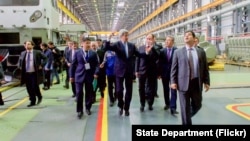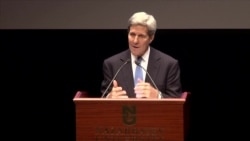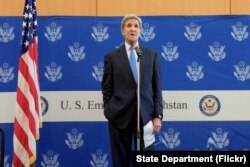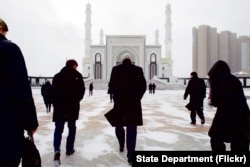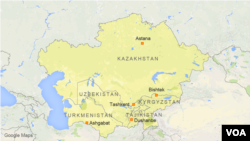U.S. Secretary of State John Kerry told Kazakhstan President Nursultan Nazarbayev Monday that the United States is appreciative of his support for nuclear non-proliferation and the fight against Islamic State insurgents.
The top U.S. diplomat stopped in the Kazakh capital of Astana as part of his four-day tour of former Soviet states in central Asia to strengthen U.S. economic and security interests in the energy-rich region. Kerry's trip comes as a more assertive Russia annexed the Crimean peninsula from Ukraine a year ago and in recent weeks launched aerial attacks in Syria against rebel groups fighting forces loyal to Syrian President Bashar al-Assad.
Watch: John Kerry speaking at Nazarbaev University:
Kerry told Nazarbayev that President Barack Obama "is very appreciative of your leadership on the (nuclear) non-proliferation issue, for countering violent extremism" and cooperation in the fight against extremists in Afghanistan and Islamic State militants.
"We have a very strong set of security interests," Kerry said of the U.S. and Kazakhstan.
Nazarbayev said he was "grateful" for the "permanent support" of the U.S. for Kazakhstan's "sovereignty and economic development."
Kerry, who is hoping to strengthen economic and security ties in the region, also met with Kazakhstan's foreign minister, Erlan Idrissove.
Terrorism concerns
In a speech at Nazarbayev University, Kerry urged Central Asian governments to not use the fear of extremism to crack down on dissent.
"Terrorism is not a legitimate excuse to lock up political opponents, diminish the rights of civil society or pin a false label on activists who are engaged in peaceful dissent," Kerry said.
In Uzbekistan Sunday, Kerry met the leaders of five former Soviet republics: Kazakhstan, Kyrgyzstan, Tajikistan, Turkmenistan and Uzbekistan, which all are concerned about a resurgence of the Taliban in Afghanistan and the recruitment of their people into such terrorist organizations as the Islamic State. Kerry addressed these concerns at the meeting in the ancient Silk Road city of Samarkand.
Earlier Sunday, Kerry spoke with Uzbekistan's President Islam Karimov, in a rare high-level U.S. encounter with the autocratic ruler who is a frequent target of human rights criticism.
Next stop Tajikistan
Tajikistan and Turkmenistan are next of the secretary's itinerary. He visited Kyrgyzstan on Saturday.
U.S. officials regard Kerry's visit as a way of assuring the Central Asian nations of the strength of their ties to Washington at a time when U.S.-Russian relations are strained. But he also is under pressure to speak out against the shortcomings of their human rights records.
U.S.-based Human Rights Watch asked Kerry to press for the release of people wrongfully imprisoned, end impunity for torture, and uphold other key rights commitments.
The Committee to Protect Journalists recently urged Kerry to bring attention to journalists jailed for political reasons and online censorship, and to decry physical attacks on members of the media. CPJ says its research indicates media freedom has "steadily worsened" in Central Asia in the post-Soviet era.
Kerry's office said Monday the secretary will visit London this week to meet with British Foreign Secretary Phillip Hammond to discuss "a range of bilateral and global issues, including Syria."




